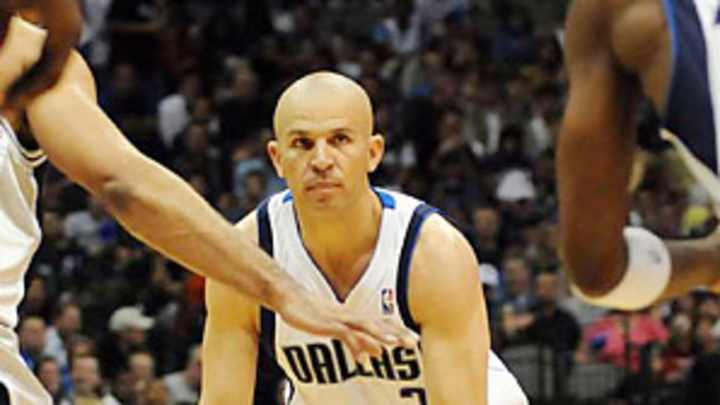Mavs choose to reload, not rebuild

It's like the Mavericks' 2008-09 season is still in motion.
Theirs was a finish of great momentum, an encouraging end to the regular season that built into a successful first round that built into a commendable second round closer than the official listing as a 4-1 loss. We now know that was no elimination in the conference semifinals. That was six weeks as a catapult.
There is a statement in Dallas' early offseason moves: The Mavs believe they've got something special in a veteran team that was only three games from missing the playoffs. How else to explain three years for the 36-year-old Kidd? Only a team in win-now mode makes that investment.
"It's hard to say what we would have done [if the finish had not been as encouraging]," owner Mark Cuban said. "We take the same approach every summer. We try to be opportunistic. If we get players we think can make us successful, we are going to do it."
Cuban will spend to an extreme, just not foolishly. He'll hold back for a 10th-seeded team and go to work on a recovery plan, but give him a real shot at 50-something victories and a playoff run and just try prying away the checkbook. In this case, the big finish showed Cuban and Co. what could be. That's the only explanation for the spending spree.
The Mavs won seven of their final nine regular-season games in a home-heavy stretch, including victories over the Rockets, Jazz and Hornets, key moments that helped them climb over New Orleans and Utah in the conference standings and avoid a dreaded first-round matchup with the Lakers. Dallas got to No. 6 and the most fortuitous opener, the crumbling Spurs. Doing what good teams do, the Mavs capitalized on the San Antonio injuries to win in five. In the conference semifinals, they lost 4-1 to the Nuggets, but were in most of the games.
Dallas could have sat out this July, built the war chest for next summer or for investing in a point guard with a better chance to still strike fear in a couple of years, and it would have been reasonable. It would have been atypical for a Cuban operation to slow-play a hand, but understandable. The Mavs aren't title contenders. There's no reason to defiantly spend another season running head first into the Lakers/Nuggets/Spurs wall just to reach the second round.
Unless they feel like this isn't that.
Give the Mavs a healthy Josh Howard (a distant memory by the end of 2008-09) and another season of Dirk Nowitzki as a star, and they obviously like the potential. Plus, they are reportedly on the verge of adding more versatility in Marion, and perhaps Gortat becomes the next they-mean-it-this-time solution at center, depending on whether Orlando matches the offer sheet. That would lead to a starting lineup of Kidd, Howard, Marion, Nowitzki and Gortat, with Sixth Man Award winner Jason Terry, J.J. Barea and maybe Brandon Bass (a free agent) off the bench. Not a title team, but credible at the least with the chance to turn into more.
It could have turned out a lot worse. The Rockets got one productive season out of Artest -- defense, three-point range and an edgy attitude for a locker room of nice guys, offsetting horrid shooting -- before the messy breakup of broken promises and his decision to sign with the rival Lakers. But there was no real damage done along the way, and that makes it a successful relationship in the Artest chronicles.
Though the departure was a particular hit coming within days of the news that Yao Ming's career could be in jeopardy, losing such a prominent player without compensation isn't the major blow it would be in other situations because Houston spent little in the first place to get him from the Kings: Bobby Jackson, Donte Greene and a No. 1 pick in 2009.
Jackson was an expiring contract who wouldn't have been a Rocket for long either way. Greene was the 28th pick in '08, and the 28th pick in any draft rarely makes an impact. The '09 first-rounder turned out to be No. 23 (Omri Casspi) in a bad draft, so no harm done. Besides, Houston still has Shane Battier at small forward with Trevor Ariza on the way, and will have four rotation players 25 or younger: Ariza, Aaron Brooks, Carl Landry and Kyle Lowry.
• Nice image recovery for Grant Hill. The caricature of the career ruined by injuries has been replaced by playing 70 games in '07-08 and 82 last season, all leading to the new reality of Hill in great demand as a free agent at 36. The Suns want him back and the Nuggets, Celtics and Knicks, among others, are making hard pitches. Years as one of the good citizens of the league are paying off. So is an '08-09 season in which he averaged 12 points and 4.9 rebounds and shot 52.3 percent in 29.8 minutes.
• Avery Johnson can afford to be very selective on his next coaching job because he has about $8 million coming from the Mavs the next two seasons, the remnants of the contract after being fired in '08. Good non-work if you can get it. He has had serious interest from the Grizzlies and Pistons in the last 5½ months alone, but held out for either a better situation or a better contract. Johnson also has TV money coming in.
• The real potential Artest issue for the Lakers may have nothing to do with personality. He is a capable ball-handler, but also a notorious ball-stopper who can dribble the offense into submission; let's see how that goes over with Kobe Bryant and Phil Jackson.
